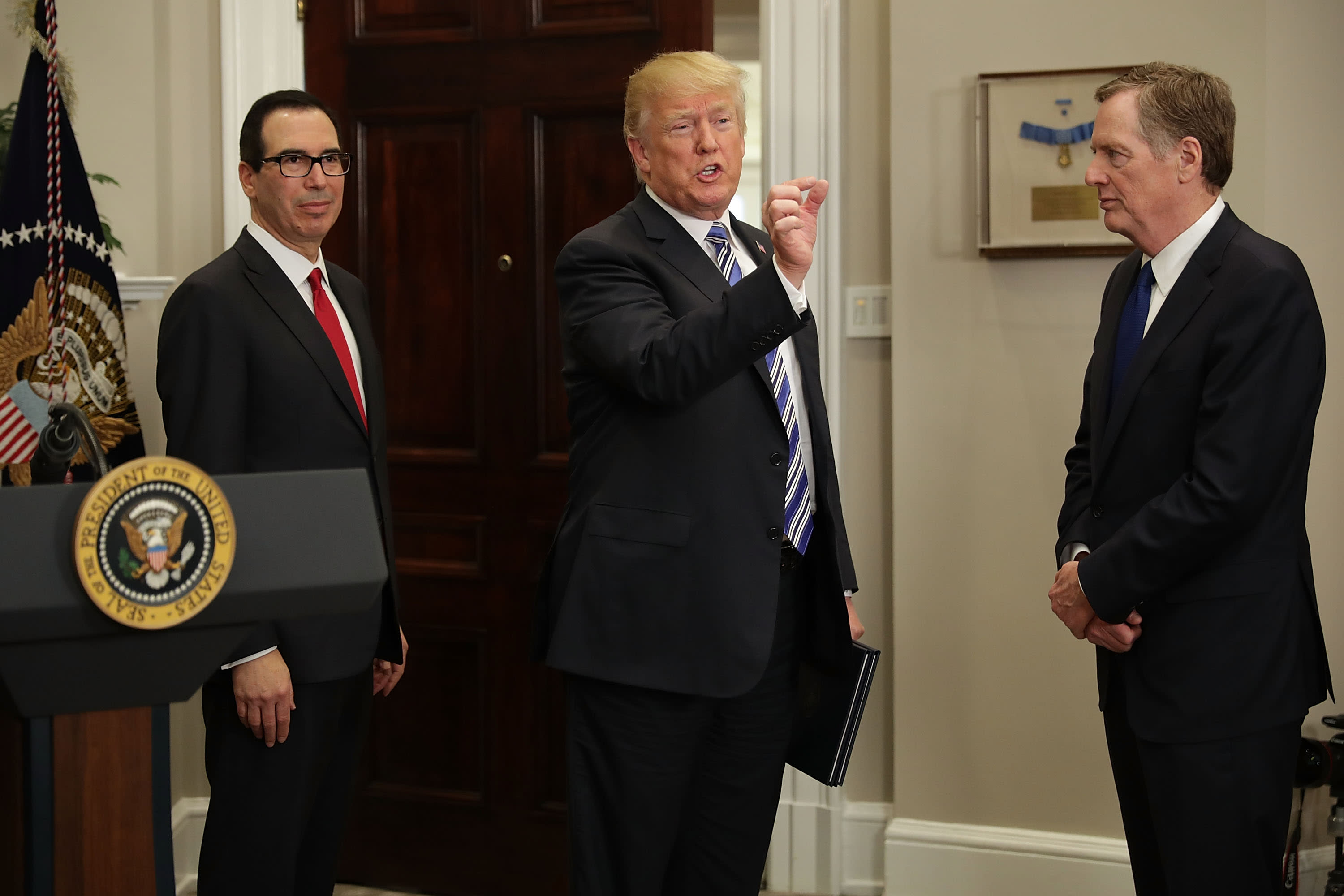'We have all these tools': Mnuchin defends using punishing tariffs to solve security problems
U.S. President Donald Trump talks to reporters with Treasury Secretary Steven Mnuchin (L) and U.S. Trade Representative Robert Lighthize...

U.S. President Donald Trump talks to reporters with Treasury Secretary Steven Mnuchin (L) and U.S. Trade Representative Robert Lighthizer (R) in the White House on March 8, 2018.
Chip Somodevilla | Getty Images
The White House has had no problem leveraging American economic heft to bring other countries to heel on issues that aren't related to the economy — and it may continue to do so, Treasury Secretary Steven Mnuchin indicated to CNBC on Sunday.
Markets have been on edge in recent weeks as U.S. President Donald Trump threatened Mexico with tariffs unless it vowed new assistance on immigration issues, and suggested that he was willing to link trade talks with Beijing to American security concerns around Chinese tech giant Huawei.
Speaking to CNBC's Nancy Hungerford in Tokyo, Mnuchin defended the president's mixing of trade and non-trade issues — something that's drawn criticism from outside commentators.
Asked if trade could again be used as a weapon in non-trade disputes, Mnuchin said, "I think it's very important that we have all these tools, that we use them. And President Trump has really done a great job at using these tools."
The secretary was referring, in particular, to the threat of tariffs on Mexico over its role in Central American migration as well as the increasing tariffs imposed on China in an attempt to address the U.S.-China trade deficit and curb what the administration calls Beijing's "unfair" trade practices.
Mnuchin stressed that Washington's ongoing campaign against telecommunications behemoth Huawei is a national security issue, not a trade-related one. But he added that Trump may soften the stiff restrictions that the U.S. has slapped on the Shenzhen-based company after feeling satisfied on the trade issue.
"As we've said all along, the Huawei discussions are really national security discussions, they're separate from trade. Both we and China have acknowledged that," Mnuchin said. "These are separate issues, they're not being linked to trade."
He then added, "I think what the president is saying is, if we move forward on trade, that perhaps he'll be willing to do certain things on Huawei if he gets comfort from China on that and certain guarantees. But these are national security issues."
U.S. officials have said they fear Huawei telecommunications infrastructure could be used for espionage, given that Chinese law requires local companies to hand over user data to the government if requested to do so. As a result, Washington has effectively blacklisted Huawei from doing business with U.S. firms. Both China and the company deny there's any risk, and Beijing officials have accused the U.S. of trying to stunt its growth as an economic power.
On the trade front, Washington has so far handed down tariffs on $250 billion worth of Chinese products, and is warning of potential tariffs on $325 billion more. Beijing has in turn imposed levies on $110 billion worth of American goods, and is threatening retaliatory measures on U.S. companies operating in China.
Trump is set to meet with Chinese President Xi Jinping at the end of this month during the G-20 Summit in Osaka, Japan, after which he'll decide whether more tariffs on China are appropriate, Mnuchin said. The Treasury secretary added that Trump is "perfectly happy" to hit China with new tariffs if the meeting doesn't go well.
On Huawei, Mnuchin added: "I'm involved in the national security issues as well, since I sit on the security council. So I'm actively involved on these discussions."
Those national security issues also include a major rallying cry of Trump's right-wing base, namely migration across the United States' southern border, which the president has labeled a national emergency.
Last month, Trump abruptly threatened to impose 5% tariffs on all Mexican imports starting June 10 unless the Mexican government increased its efforts to stem migration from Central America. They would increase to 25% over several months if Mexico did not meet White House demands, the president said.
The impending tariffs were suspended Friday after Trump announced the two countries reached a deal on migration control. Washington has warned, however, that Trump will still impose the tariffs at any time if his demands are not met.
"The immigration issue was a very serious issue, we couldn't be more pleased that Mexico came to the table and negotiated an agreement, and because of that we don't need to put tariffs on them," Mnuchin said.
Trump's threats triggered harsh opposition from both Democrats and Republicans and shook markets, already under strain from the uncertainty of the U.S.-China trade war. Even administration officials, including Mnuchin and U.S. Trade Representative Robert Lighthizer, are said to have opposed Mexico tariffs, and some business groups were reportedly preparing to sue the administration.
"I have every reason to believe they will meet their commitments," the secretary said of Mexico's government. "But if for whatever reason they don't, the president reserves the right to put on tariffs."
—CNBC's Spencer Kimball contributed to this report
Read More